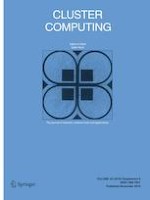27.03.2018
A novel flip-flop based error free, area efficient and low power pipeline architecture for finite impulse recursive system
Erschienen in: Cluster Computing | Sonderheft 6/2019
EinloggenAktivieren Sie unsere intelligente Suche, um passende Fachinhalte oder Patente zu finden.
Wählen Sie Textabschnitte aus um mit Künstlicher Intelligenz passenden Patente zu finden. powered by
Markieren Sie Textabschnitte, um KI-gestützt weitere passende Inhalte zu finden. powered by
